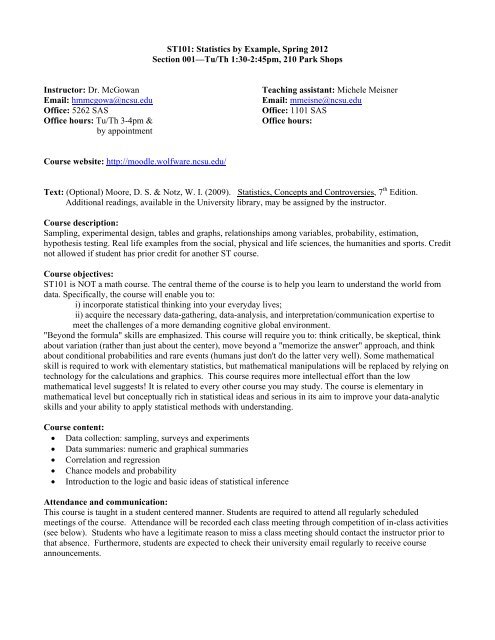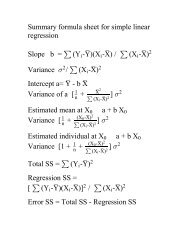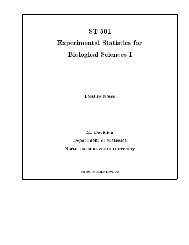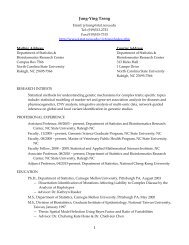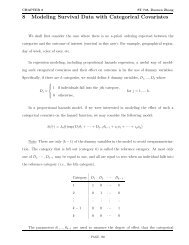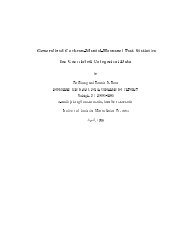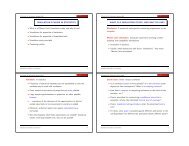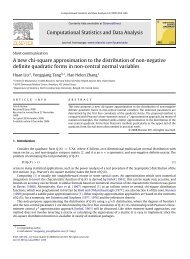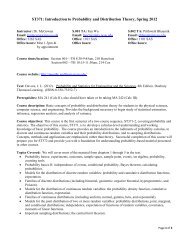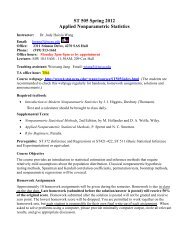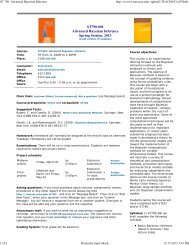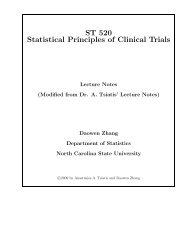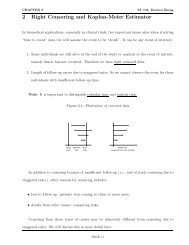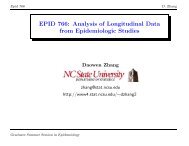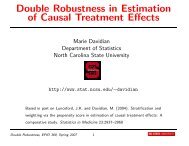ST 101 - NCSU Statistics
ST 101 - NCSU Statistics
ST 101 - NCSU Statistics
Create successful ePaper yourself
Turn your PDF publications into a flip-book with our unique Google optimized e-Paper software.
Instructor: Dr. McGowan<br />
Email: hmmcgowa@ncsu.edu<br />
Office: 5262 SAS<br />
Office hours: Tu/Th 3-4pm &<br />
by appointment<br />
Course website: http://moodle.wolfware.ncsu.edu/<br />
<strong>ST</strong><strong>101</strong>: <strong>Statistics</strong> by Example, Spring 2012<br />
Section 001—Tu/Th 1:30-2:45pm, 210 Park Shops<br />
Teaching assistant: Michele Meisner<br />
Email: mmeisne@ncsu.edu<br />
Office: 1<strong>101</strong> SAS<br />
Office hours:<br />
Text: (Optional) Moore, D. S. & Notz, W. I. (2009). <strong>Statistics</strong>, Concepts and Controversies, 7 th Edition.<br />
Additional readings, available in the University library, may be assigned by the instructor.<br />
Course description:<br />
Sampling, experimental design, tables and graphs, relationships among variables, probability, estimation,<br />
hypothesis testing. Real life examples from the social, physical and life sciences, the humanities and sports. Credit<br />
not allowed if student has prior credit for another <strong>ST</strong> course.<br />
Course objectives:<br />
<strong>ST</strong><strong>101</strong> is NOT a math course. The central theme of the course is to help you learn to understand the world from<br />
data. Specifically, the course will enable you to:<br />
i) incorporate statistical thinking into your everyday lives;<br />
ii) acquire the necessary data-gathering, data-analysis, and interpretation/communication expertise to<br />
meet the challenges of a more demanding cognitive global environment.<br />
"Beyond the formula" skills are emphasized. This course will require you to: think critically, be skeptical, think<br />
about variation (rather than just about the center), move beyond a "memorize the answer" approach, and think<br />
about conditional probabilities and rare events (humans just don't do the latter very well). Some mathematical<br />
skill is required to work with elementary statistics, but mathematical manipulations will be replaced by relying on<br />
technology for the calculations and graphics. This course requires more intellectual effort than the low<br />
mathematical level suggests! It is related to every other course you may study. The course is elementary in<br />
mathematical level but conceptually rich in statistical ideas and serious in its aim to improve your data-analytic<br />
skills and your ability to apply statistical methods with understanding.<br />
Course content:<br />
� Data collection: sampling, surveys and experiments<br />
� Data summaries: numeric and graphical summaries<br />
� Correlation and regression<br />
� Chance models and probability<br />
� Introduction to the logic and basic ideas of statistical inference<br />
Attendance and communication:<br />
This course is taught in a student centered manner. Students are required to attend all regularly scheduled<br />
meetings of the course. Attendance will be recorded each class meeting through competition of in-class activities<br />
(see below). Students who have a legitimate reason to miss a class meeting should contact the instructor prior to<br />
that absence. Furthermore, students are expected to check their university email regularly to receive course<br />
announcements.
Grades:<br />
It is the student’s responsibility to be aware of their grades in the course and the appropriate level of work<br />
required. Your final grade in this course will depend on the following<br />
In-class activities 100 points<br />
Homework 100 points<br />
2 Midterms 100 points each<br />
Final Exam 200 points<br />
Total 600 points<br />
Grades will be determined by calculating the student’s percentage out of the available points and comparing with<br />
predetermined cutoff points as follows: A+: 98%, A: 92%, A-: 90%, B+: 88%, B: 82%, B-:80%, C+: 78%,<br />
C: 72%, C-:70%, D+: 68%, D: 62%, D-: 60%. Percentage cutoffs are firm and no rounding occurs. Incomplete<br />
(IN) grades are given only as specified in university regulations.<br />
In-class Activities: Each class period, students will complete activities and exercises that illustrate course content.<br />
Select activities will be collected and graded on content and presentation. No late activities will be accepted.<br />
Homework: Homework will be due every Tuesday, starting on January 24. Assignments will be posted on<br />
Moodle one week before they are due, and submitted via the website.<br />
� The lowest two homework scores will be dropped.<br />
� No late homework will be accepted.<br />
Exams: The midterms are tentatively scheduled for February 16 and April 12 during regular class time. The<br />
cumulative final exam will be held on Tuesday, May 8 from 1-4pm.<br />
� All exams will be closed book. Students are allowed one 8½ by 11 inch sheet of notes (both sides, any<br />
content).<br />
� Students should bring a calculator. Students may NOT share calculators during exams.<br />
� All cell phones, PDAs and any web-enabled devices must be turned off and put away during exams; these<br />
devices can NOT be used as calculators or time keeping devices.<br />
� Students may NOT leave the room and return for any reason during exams.<br />
� Any conflicts with the scheduled exam dates must be submitted in writing to the instructor well in advance.<br />
If advanced notice cannot be provided, it must be given as soon as possible after the exam. In all cases,<br />
suitable documentation (such as a physicians note) must be provided in order for a student to take a makeup<br />
exam. Students who have a personal emergency (extreme family illness or death, etc) should contact the<br />
Division of Undergraduate Academic Programs (Park Shops, 515-3037) to obtain documentation.<br />
Policy on academic integrity:<br />
Plagiarism, cheating, and other forms of academic dishonesty will not be tolerated. To create a fair and equitable<br />
environment the instructor aggressively enforces the universities policies on academic misconduct. All cases of<br />
academic misconduct will be handled as set out in university policies. For additional information see<br />
http://www.ncsu.edu/policies/student_services/student_conduct/POL445.00.1.htm.<br />
Students with disabilities:<br />
Reasonable accommodations will be made for students with verifiable disabilities. Any student who feels they<br />
may need an accommodation based on the impact of a disability should contact the instructor privately to discuss<br />
your specific needs. In order to take advantage of available accommodations, students must register with<br />
Disability Services for Students at 1900 Student Health Center, Campus Box 7509, 515-7653.<br />
http://www.ncsu.edu/provost/offices/affirm_action/dss/. For more information on NC State's policy on working<br />
with students with disabilities, please see<br />
http://www.ncsu.edu/policies/academic_affairs/pols_regs/REG205.00.28.php.


